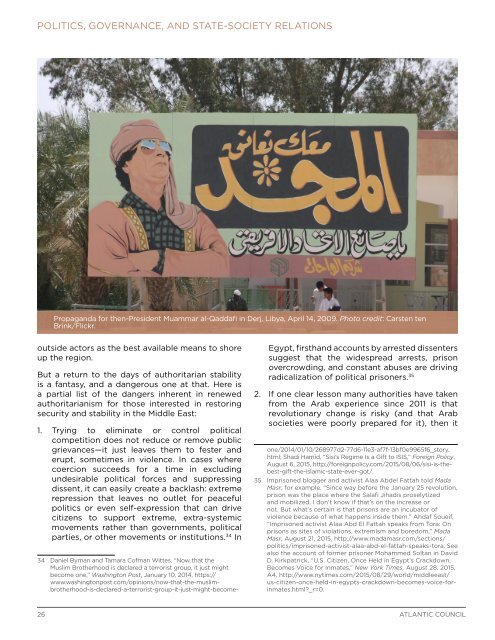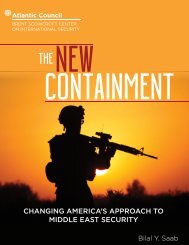POLITICS GOVERNANCE STATE-SOCIETY RELATIONS
Politics_Governance_and_State-Society_Relations_web_1121
Politics_Governance_and_State-Society_Relations_web_1121
Create successful ePaper yourself
Turn your PDF publications into a flip-book with our unique Google optimized e-Paper software.
<strong>POLITICS</strong>, <strong>GOVERNANCE</strong>, AND <strong>STATE</strong>-<strong>SOCIETY</strong> <strong>RELATIONS</strong><br />
Propaganda for then-President Muammar al-Qaddafi in Derj, Libya, April 14, 2009. Photo credit: Carsten ten<br />
Brink/Flickr.<br />
outside actors as the best available means to shore<br />
up the region.<br />
But a return to the days of authoritarian stability<br />
is a fantasy, and a dangerous one at that. Here is<br />
a partial list of the dangers inherent in renewed<br />
authoritarianism for those interested in restoring<br />
security and stability in the Middle East:<br />
1. Trying to eliminate or control political<br />
competition does not reduce or remove public<br />
grievances—it just leaves them to fester and<br />
erupt, sometimes in violence. In cases where<br />
coercion succeeds for a time in excluding<br />
undesirable political forces and suppressing<br />
dissent, it can easily create a backlash: extreme<br />
repression that leaves no outlet for peaceful<br />
politics or even self-expression that can drive<br />
citizens to support extreme, extra-systemic<br />
movements rather than governments, political<br />
parties, or other movements or institutions. 34 In<br />
34 Daniel Byman and Tamara Cofman Wittes, “Now that the<br />
Muslim Brotherhood is declared a terrorist group, it just might<br />
become one,” Washington Post, January 10, 2014, https://<br />
www.washingtonpost.com/opinions/now-that-the-muslim-<br />
brotherhood-is-declared-a-terrorist-group-it-just-might-become-<br />
Egypt, firsthand accounts by arrested dissenters<br />
suggest that the widespread arrests, prison<br />
overcrowding, and constant abuses are driving<br />
radicalization of political prisoners. 35<br />
2. If one clear lesson many authorities have taken<br />
from the Arab experience since 2011 is that<br />
revolutionary change is risky (and that Arab<br />
societies were poorly prepared for it), then it<br />
one/2014/01/10/268977d2-77d6-11e3-af7f-13bf0e9965f6_story.<br />
html; Shadi Hamid, “Sisi’s Regime Is a Gift to ISIS,” Foreign Policy,<br />
August 6, 2015, http://foreignpolicy.com/2015/08/06/sisi-is-thebest-gift-the-islamic-state-ever-got/.<br />
35 Imprisoned blogger and activist Alaa Abdel Fattah told Mada<br />
Masr, for example, “Since way before the January 25 revolution,<br />
prison was the place where the Salafi Jihadis proselytized<br />
and mobilized. I don’t know if that’s on the increase or<br />
not. But what’s certain is that prisons are an incubator of<br />
violence because of what happens inside them.” Ahdaf Soueif,<br />
“Imprisoned activist Alaa Abd El Fattah speaks from Tora: On<br />
prisons as sites of violations, extremism and boredom,” Mada<br />
Masr, August 21, 2015, http://www.madamasr.com/sections/<br />
politics/imprisoned-activist-alaa-abd-el-fattah-speaks-tora. See<br />
also the account of former prisoner Mohammed Soltan in David<br />
D. Kirkpatrick, “U.S. Citizen, Once Held in Egypt’s Crackdown,<br />
Becomes Voice for Inmates,” New York Times, August 28, 2015,<br />
A4, http://www.nytimes.com/2015/08/29/world/middleeast/<br />
us-citizen-once-held-in-egypts-crackdown-becomes-voice-forinmates.html?_r=0.<br />
26 ATLANTIC COUNCIL



